|
|
|
Sort Order |
|
|
|
Items / Page
|
|
|
|
|
|
|
| Srl | Item |
| 1 |
ID:
141071
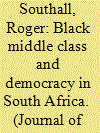

|
|
|
|
|
| Summary/Abstract |
Against the background of celebrations about the rise of a middle class in Africa and its widely posited role in promoting democracy, this paper explores the politics of the black middle class in South Africa. It does so by examining three propositions: first, that the black middle class was a positive force in the struggle for liberation and democracy; second, that post-1994 strategies of the African National Congress (ANC) government which have benefited it secure its political alignment with the ANC's ‘party-state’; and third, that its growth and increasing diversity will contribute to the consolidation of democracy. The conclusion drawn is that while the black middle class may indeed play an important role in furthering democracy, its political orientations and behaviour cannot be assumed to be inherently progressive.
|
|
|
|
|
|
|
|
|
|
|
|
|
|
|
|
| 2 |
ID:
141066
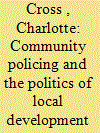

|
|
|
|
|
| Summary/Abstract |
This paper explores how the concept of ‘community policing’ has been understood and implemented in Tanzania. Whilst community policing is locally considered to be a very effective means of preventing crime and improving neighbourhood safety, the extent to which it constitutes a more accountable, responsive or ‘democratic’ form of policing, as assumed by proponents, is questionable. Based on research conducted in the city of Mwanza, this paper explains these outcomes in terms of continuities between forms of popular mobilisation that developed during Tanzania's socialist one-party era, and particularly the co-optation by the ruling party of sungusungu vigilantism, and understandings of the role of citizen participation in local development today. However, this paper suggests that as multiparty political competition becomes increasingly competitive, the sustainability of this model of community policing may be undermined, as citizens challenge the notion that they are obliged to provide resources for development directed from above.
|
|
|
|
|
|
|
|
|
|
|
|
|
|
|
|
| 3 |
ID:
141070
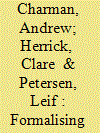

|
|
|
|
|
| Summary/Abstract |
In early 2012, South Africa's Western Cape Province enacted new alcohol control legislation amid mounting concern with the costs of alcohol-related harms. This has focused on urban shebeen closure to control the informal, unlicensed trade and the harms it generates through crime, violence and injury. In contrast to policy discourse, this paper contends that rather than existing outside regulation, the city's shebeeners embrace multiple (self and collective) regulatory strategies to manage the inherent risks of their own informality. Drawing on novel empirical data including a ‘business census’ and interviews with the police and liquor traders across four Cape Town case study sites, the paper adds new depth to contemporary engagements with the appropriate and equitable regulation of the South African informal liquor trade.
|
|
|
|
|
|
|
|
|
|
|
|
|
|
|
|
| 4 |
ID:
141067


|
|
|
|
|
| Summary/Abstract |
Although conflict in Zimbabwe's diamond mining sector has recently received much international scrutiny, very little research has examined conflict in Zimbabwe's gold mining sector. This article analyses how a nationwide crackdown called Operation Chikorokoza Chapera (‘No More Illegal Mining’) affected – and ‘disciplined’ – livelihoods in profound ways in both licensed and unlicensed gold mining regions. Drawing on interviews conducted between 2006 and 2013 with artisanal miners in the Insiza, Umzingwani and Kadoma areas as well as miners who crossed the border to Mozambique, the study reveals how a highly politicised crackdown led to uneven consequences. The analysis highlights both structural and physical violence, with more than 25,000 miners and traders arrested between 2006 and 2009 and more than 9,000 still imprisoned in 2013. Situating the crackdown within evolving political and economic interests, the study contributes to an understanding of how simplified discourses on ‘eradicating illegal mining’ mislead and mask power dynamics, while policing activities transform patterns of resource control. The study also emphasises that conceptualisations of the crackdown's legacy should carefully consider the agency of artisanal miners' associations, which, in some cases, have been actively seeking to resist coercive policies and rebuild livelihoods in the aftermath of Operation Chikorokoza Chapera.
|
|
|
|
|
|
|
|
|
|
|
|
|
|
|
|
| 5 |
ID:
141068
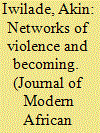

|
|
|
|
|
| Summary/Abstract |
This article argues that access to clientelistic networks is central to the ability of youth to engage in violent activities in Nigeria's oil-rich Delta. Even though the literature has demonstrated that the contradictions of oil wealth and economic neglect provide the backdrop for conflict in the region, the actual channels through which it becomes possible to activate incentives for violence have not been properly addressed. It also points out that a fixation on the narrative of resistance has undermined our ability to engage with other critical variables such as social codes of masculinity, survival and ‘becoming’ which play very central roles in animating violent networks in the region. Drawing evidence from interview data, the article uses the lived experiences of ‘ex-militants’ to highlight these points as well as to raise questions about the applications of neopatrimonial theory to governance projects in African states.
|
|
|
|
|
|
|
|
|
|
|
|
|
|
|
|
| 6 |
ID:
141069
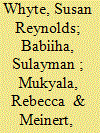

|
|
|
|
|
| Summary/Abstract |
As peace returns to northern Uganda, a unique arithmetic of development is evident in the former Internally Displaced Persons camps. Small trading centres whose populations multiplied as they became camps now envision futures as Town Boards. Subtraction is necessary: the displaced people and the dead buried in the camps are being returned to their rural villages. Urban planners have produced meticulous drawings that envisage the division of land into plots for development. Donors are making additions in the form of new market buildings and water supplies. Yet this arithmetic must reckon with new problems as time passes. The article is based primarily on fieldwork in Awach, a former IDP camp now slated for status as a Town Board. In analysing material from interviews with landowners, ‘remainders’ who stayed behind after the camp closed, local leaders and officials, we emphasise the paradoxes, tensions and conflicts of this special path to development.
|
|
|
|
|
|
|
|
|
|
|
|
|
|
|
|
|
|
|
|
|